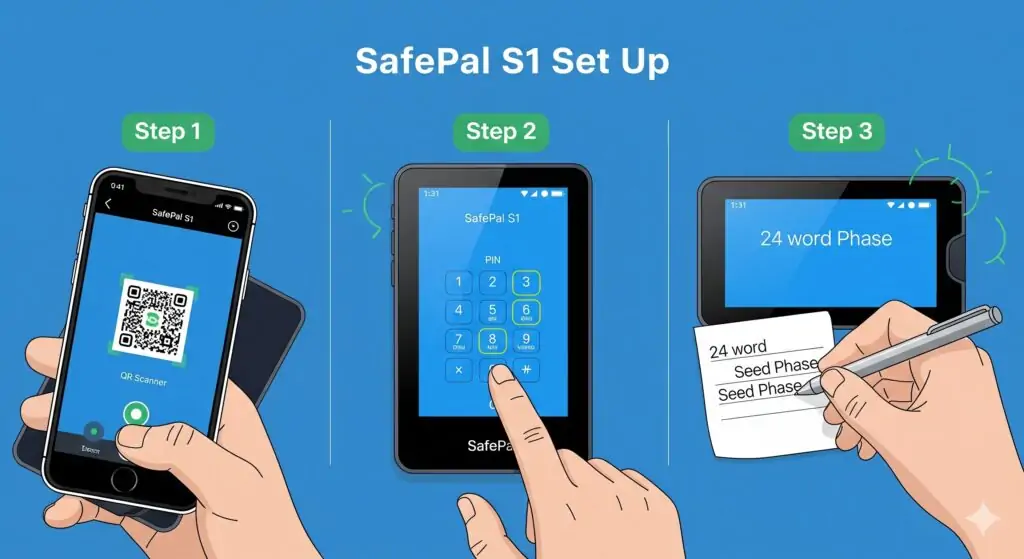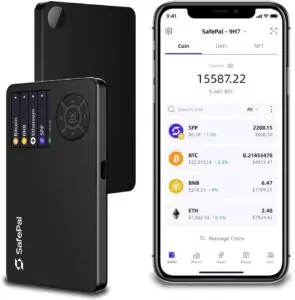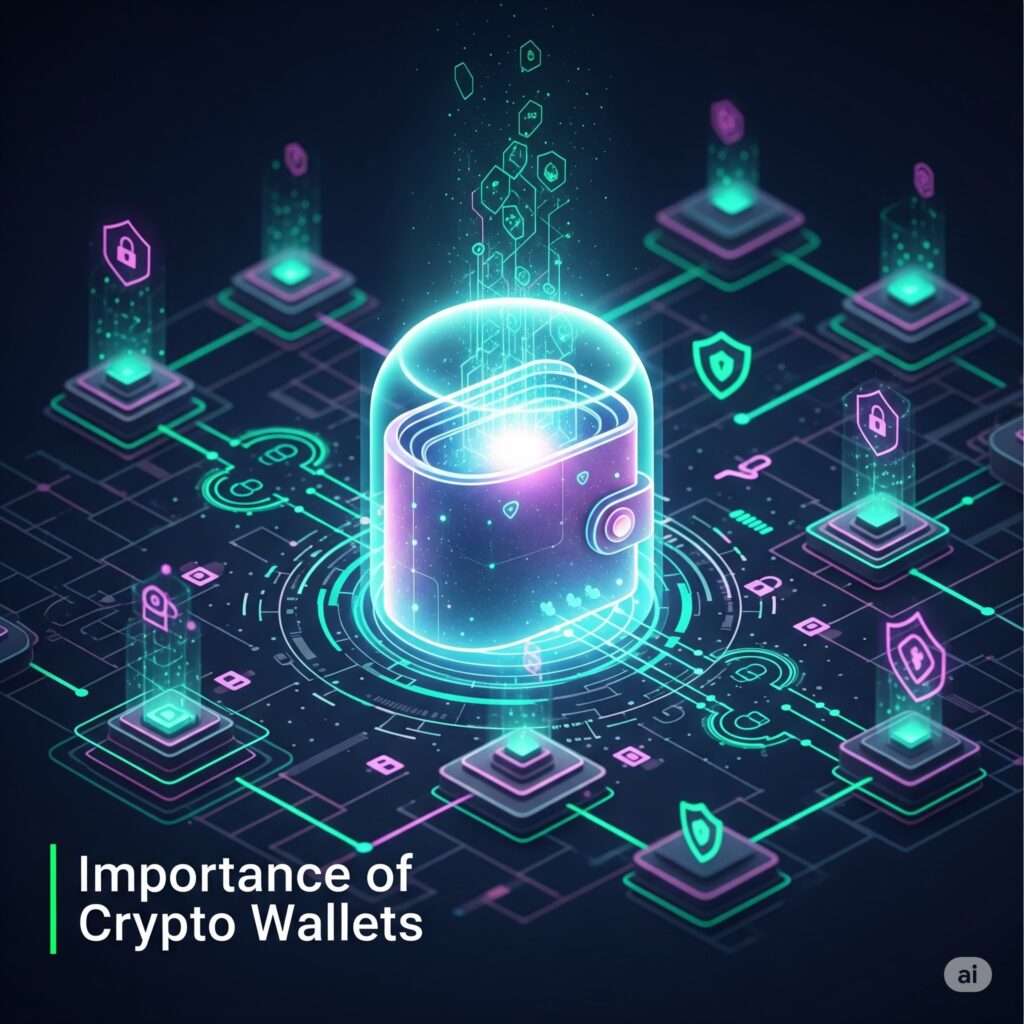SafePal S1 Review: Affordable, Air-Gapped Security for Crypto Enthusiasts
SafePal S1: Comprehensive Crypto Wallet Review
- September 4, 2025
- 1:07 pm
- Chinmay J
Design and Build
The SafePal S1 boasts a compact, card-like design (86mm x 54mm x 6mm, 110g) resembling a credit card calculator. It’s made from durable ABS plastic with a metal frame for added strength, featuring a 1.3-inch IPS screen (240×240 resolution) and a D-pad for navigation. No battery, it’s powered by the app during use, enhancing security by avoiding always-on components. The build is sturdy but feels less premium than metal rivals; it’s drop-resistant and splash-proof (no official IP rating). Overall, it’s portable and discreet, ideal for everyday carry.
The S1 prioritizes simplicity for beginners, with an intuitive D-pad and screen interface. Pairing via QR codes eliminates connectivity risks, but it can feel clunky for frequent users. The companion app (iOS/Android) handles most tasks, making it accessible. However, the lack of touchscreen or buttons may frustrate some compared to rivals like Ledger. Overall, it’s user-friendly for basic holding but requires app reliance for advanced features.
Step-by-Step How-To Guide
Setting up the SafePal S1 is straightforward and takes about 10 minutes. Here’s a detailed guide:
- Download the App: Install the SafePal app from Google Play or App Store (ensure it’s official to avoid fakes).
- Power On the Device: Press the power button—the screen lights up.
- Create a Wallet: In the app, select “Hardware Wallet” > “SafePal S1” > “Create New Wallet.” Scan the QR code displayed on the S1 to pair.
- Set PIN: Enter a 6-8 digit PIN on the S1’s D-pad and confirm.
- Backup Seed Phrase: The S1 displays a 12/18/24-word seed phrase. Write it down securely (use metal backups for durability) and verify by re-entering words.
- Add Coins: In the app, select assets (e.g., BTC, ETH) and generate addresses by scanning QR codes between app and device.
- Transfer Assets: Send crypto to the generated addresses for secure storage.
Always setup in a safe environment and test small transfers first.

Usability
Usability is strong for a budget device, with the app providing a seamless DApp browser, swaps, and NFT support. Transactions involve QR scanning: App generates a code, S1 scans/signs, app broadcasts. It’s efficient for occasional use but tedious for high-volume trading. The screen is clear for verification, and the app supports 15 languages. However, no direct desktop integration limits some users.
Supported Coins
The S1 supports over 30,000 tokens across 100+ blockchains, including Bitcoin (BTC), Ethereum (ETH), Binance Smart Chain (BNB), Solana (SOL), Cardano (ADA), Polkadot (DOT), Tron (TRX), and ERC-20/BEP-20 standards. It handles NFTs and DeFi tokens via the app. For a full list, check SafePal’s supported assets, it’s one of the broadest, rivaling Ledger, with regular updates.

Staking Information
Staking is supported via the app for several PoS coins, with the S1 signing transactions offline. Compatible assets include Ethereum (ETH via Lido, 4-7% APY), Cardano (ADA, 4-5%), Solana (SOL, 6-8%), Polkadot (DOT, 10-12%), Cosmos (ATOM, 12-18%), and Tron (TRX, 4-6%).
Setup: Delegate in the app, scan QR to approve on S1. No direct minimums for pools; yields are network-based. It’s secure but app-reliant.
Connectivity Type
The S1 is fully air-gapped, no Bluetooth, Wi-Fi, USB, or NFC. All interactions use QR codes: App generates codes for signing, S1 scans and responds. This eliminates wireless vulnerabilities but requires a camera-equipped device (Android/iOS). Compatible with Windows/macOS via emulators, but primarily mobile-focused. No cables needed, enhancing portability.
Security
Security is the S1’s standout feature, with an EAL5+ certified secure element chip for key storage. It includes a self-destruct mechanism on tampering (erases data after 5 wrong PINs), true random number generator, and offline signing. Audited by Kraken Labs (flaws fixed in 2020). No known major breaches; air-gapped design prevents malware. Supports BIP39 seeds and passphrases. Downside: App vulnerabilities could indirectly affect usability.
Features
Beyond storage, features include an integrated DApp browser for DeFi/NFTs, in-app swaps (via partners like 1inch), fiat buys, and multi-language support (15+). The app offers portfolio tracking and news. Unique: Completely offline, with QR-based firmware updates. No touchscreen, but D-pad is responsive. Supports seed imports from other wallets.
Pros and Cons
- Extremely secure air-gapped design.
- Affordable at $49.99.
- Supports 30,000+ tokens and staking.
- User-friendly app with DApps and swaps.
- Portable and no battery hassles.
Cons:
- QR scanning can be tedious for frequent use.
- Plastic build feels cheap; prone to fingerprints.
- App glitches reported (e.g., sync issues).
- Slow customer support (days for responses).
- Limited direct staking options; relies on integrations.
Conclusion
For alternatives, check our Ledger Nano X review.
For a head to head comparison of Ledger Nano X vs Trezor Model T click here.
Don’t forget to check out our list of “Best Crypto Wallets 2025” click here.



